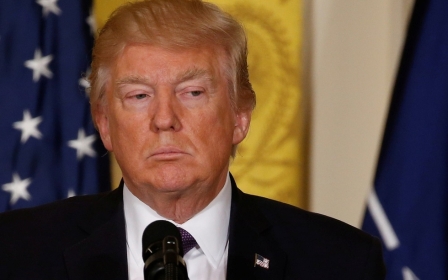ANALYSIS: Trump policy on Middle East takes shape
NEW YORK, United States – During his election campaign, Donald Trump’s Middle East policy offered scattergun policies to “bomb the hell out of” the Islamic State group (IS), pilfer Iraq’s oil and pull American troops out of the “big, fat quagmire”.
Since he moved into the West Wing, Trump has twice tried to dislocate the United States from that region with so-called “Muslims bans” on travellers from several Middle Eastern countries. Both attempts sparked outrage and protests and were blocked by US courts.
Now, 89 days into his presidency, analysts contacted by Middle East Eye said Trump’s earlier rhetoric had proven itself to be an unpopular liability that was being dropped in favour of more conventional Washington approaches to the region.
Conventional policies
“Trump’s natural and deeply ingrained belligerency was manifest in what he said about Iran, nuking IS and China. Since entering the White House, he has not followed through on his nebulous sentiments about Russia or our endless wars in the Middle East,” Michael Brenner, an international affairs professor at the University of Pittsburgh, told MEE.
“Instead, he’s found it politically and intellectually convenient to sign on to the Washington consensus with regard to Middle East matters. There is today no difference between the Obama administration view of the Middle East and the Trump administration view of the region.”
Brenner and other experts pointed to recent US displays of firepower, with this month’s launch of dozens of Tomahawk missiles at Shayrat air base in Syria, in response to an alleged poison gas attack, and the bombing of IS fighters in Afghanistan with an 11-tonne “mother of all bombs”.
There is today no difference between the Obama administration view of the Middle East and the Trump administration view of the region
- Michael Brenner, professor of international relations
Meanwhile, Trump’s team is reverting to the Middle East orthodoxies of singling out Iran as nefarious and backing such allies as Israel, Saudi Arabia and other Gulf petro-monarchies despite allegations of human rights violations.
This week, Trump, a Republican, congratulated Turkish President Recep Tayyip Erdogan for winning a referendum that would significantly increase the powers of the presidency, despite fears of that country’s drift towards autocracy and a crackdown on dissenters after last year’s failed coup.
Last month, Trump hosted Abdel Fattah al-Sisi at the White House in a bid to “reboot” relations between the two countries, which flagged during the Egyptian president’s crackdown on the Muslim Brotherhood and detention of some 40,000 political prisoners.
“Trump is realising the limits of isolationism in an interconnected world,” Robert Amsterdam, a lawyer at the firm Amsterdam & Partners, which lists Turkey’s government among its global clients, told MEE.
“Spouting slogans used by Charles Lindbergh in the 1920s doesn’t go very far in today’s world,” he added, referring to the prominent isolationist. “He’s not a man of any ideological bent or principle, so I think he’s very easy and willing to change positions.”
Trump's relationship with the Gulf
Foreign policy U-turns may form part of an administration-wide overhaul, in which the hardline views of Trump’s anti-globalist chief strategist, Steve Bannon, and his former national security adviser, Michael Flynn, who resigned in February, are marginalised.
In their wake, more mainstream minds get prominence, such as Flynn’s replacement, Lieutenant General HR McMaster, defence secretary Jim Mattis, a retired Marine Corps general, and Secretary of State Rex Tillerson, a former oil company boss.
Mattis, who served in Iraq in 1991 and 2003 and later directed all allied forces in the Middle East, returned to the region this week for talks in Saudi Arabia, Egypt, Israel and Qatar to “re-affirm key US military alliances”, the Pentagon said in a statement.
In Riyadh on Wednesday, he called for UN-brokered talks to resolve the conflict in Yemen, where Washington backs a Saudi-led coalition that seeks to restore the Aden-based government of Abd Rabbu Mansour Hadi to power.
Through this support, the US is accused of backing Riyadh’s controversial aerial bombing campaign in a three-year-old conflict that has killed at least 10,000 people and displaced more than three million. Millions more are also struggling to feed themselves.
Trump team officials are understood to be considering deepening Washington’s role in Yemen by more directly aiding its Gulf allies in their fight against Iranian-backed Houthi rebels, who control the capital Sanaa and large swathes of territory.
“Everywhere you look if there is trouble in the region, you find Iran,” Mattis said after talks on Yemen and other hotspots with King Salman and Deputy Crown Prince and defence minister Mohammed bin Salman.
“We will have to overcome Iran’s efforts to destabilise yet another country and create another militia in their image of Lebanese Hezbollah, but the bottom line is we are on the right path for it,” Mattis added.
Mattis gave no details on what additional support, if any, the US would offer the Saudi-led coalition. But he said he was looking to deepen and broaden the relationship between the two countries on the trip.
A review of possible US assistance, which already includes intelligence support, could include the sale of precision-guided munitions. Government and rebel forces continue to fight despite seven UN-backed ceasefires and repeated peace talks.
Foreign policy U-turns
According to Amsterdam, more US support to Saudi would bolster an alliance that suffered during the previous administration of Barack Obama, a Democrat, while targeting the Tehran-backed Houthis and thus “turning up the temperature on Iran”, he said.
Kathy Kelly, a peace activist who recently completed a six-day hunger strike at UN headquarters in New York, warned that boosting US support would worsen a famine that has left some 17 million Yemenis needing food handouts.
“The Saudis rely on US assistance to refuel their jets and uses US-made weaponry for conventional attacks on a civilian population, which makes the US complicit in war crimes,” Kelly told MEE.
“General Mattis may well be putting the US further into that quicksand of sinking below the standards of international law.”
Mattis’s trip is also expected to offer insights on the Trump administration’s tactics in the fight against IS militants, what measures it will take against Syrian President Bashar al-Assad and its willingness to deploy more military power than Obama did.
General Mattis may well be putting the US further into that quicksand of sinking below the standards of international law
- Kathy Kelly, peace activist
US allies question whether Washington has formulated a strategy to prevent areas of Syria seized from militants from collapsing into ethnic and sectarian feuds or succumbing to a new generation of extremism, as parts of Iraq and Afghanistan have done since US interventions.
For Trump, foreign policy U-turns have cost him some support. Ann Coulter was one of several right-wing commentators to criticise a president they had previously backed, saying his missile attack on Syria “violates every promise he ran on”.
But there is evidence that Trump still has support from those who won him the White House. A Pew Research Centre survey this month found that 92 percent of Republicans and Republican-leaning independents say he has done as well or better than expected.
Trump, however, may be more mindful of his overall approval ratings, which are lower than they were for his previous five predecessors during their first years in office – 54 percent say they disapprove of the job he is doing, while 39 percent approve.
According to Kelly, Trump may have been steamrollered into policy shifts and “more or less neutered by the political establishment in Washington”. For Brenner, the Trump administration is still too scattergun to be taken seriously.
“It has no strategy. It has no particular view of the complex interplay and multi-layered relationships within the Middle East. It acts on the basis of impulse,” Brenner told MEE. “To search for deeper meaning and a doctrine is not only fruitless and pointless, but is misleading.”
Middle East Eye propose une couverture et une analyse indépendantes et incomparables du Moyen-Orient, de l’Afrique du Nord et d’autres régions du monde. Pour en savoir plus sur la reprise de ce contenu et les frais qui s’appliquent, veuillez remplir ce formulaire [en anglais]. Pour en savoir plus sur MEE, cliquez ici [en anglais].




